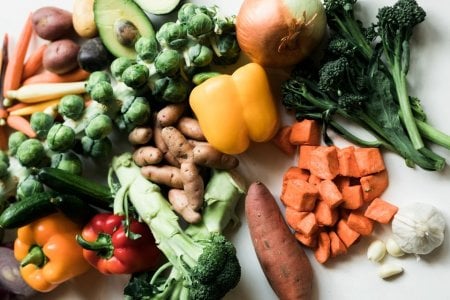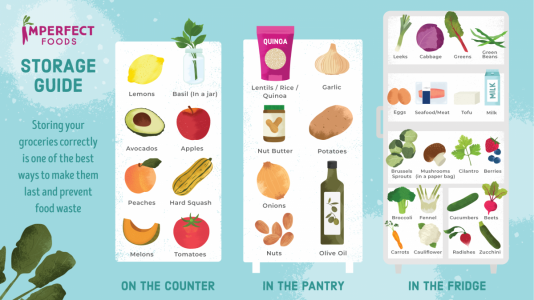Hate wasting veggies? Aussie mum shares three MUST-TRY storage tips to make them last longer
We’ve already featured Chantel Mila for her simple tips on how to turn your bedroom into a luxurious sanctuary.
But now, the Melbourne mum is back for more! This time, she has revealed three ways to store your vegetables that will keep them from rotting and wilting for weeks.
What’s more, the process is quick and easy. All you need are a couple of air-tight containers, water, a knife, and the fridge.
Her clip on the popular video-sharing app Tiktok has amassed over 284.6K views and 12.5K likes.
Scroll down to watch the video below.
The 14-second clip begins with Chantel’s suggestion of submerging the stems of your herbs in water. In much the same way putting flowers in a vase with some water keeps them fresher for longer, this method, she says, should keep things like coriander, parsely, and mint from wilting as quickly as they otherwise would.
Water is also important in keeping many plants fresh. And then you get the added perk of tastier food!
Her next suggestion is to put a damp paper towel over your green leafy vegetables so that they remain crisp. Why? The paper towel trick works by absorbing any excess moisture from the veggies. When greens are stored wet, they can become slimy and mouldy quickly.
You can double down on the tip by putting them inside a sealed container. Shutting out excess air means that your produce won’t wilt as easily.

Chantel Mila, who also goes by Mama Mila online, posts quick and easy cleaning and styling DIYs on TikTok and Instagram. Credit: Instagram/Chantel Mila/DailyMail
Lastly, Chantel urged her viewers to chop their carrots into bite-size pieces and keep them in water. Water, again, is useful in maintaining the crispness of the root vegetable.
Cut carrots also make for healthy and quick snacks.
But there are more things you can do to make your fresh fruit and vegetables last longer.
Emilie Vanpoperinghe, founder of Oddbox, says that most fresh produce can be kept in the freezer. However, you will need to blanch them first. This entails a quick boil before transferring the veggies to cold water so that it isn’t accidentally cooked. Doing this should neutralise the bacteria that speed up spoilage.

You can prolong the life of your produce and minimise food waste by putting veggies and fruits in the fridge. Credit: Unsplash/Nathan Dumlao
Chantel’s suggestion of using towels to absorb moisture is also sound because water-dense veggies lose their structure when put in the freezer and then defrosted. Water both expands and shrinks when frozen, which will then cause vegetables to become soggy.
(That sounds contradictory, but water behaves differently than other liquids during the freezing process. It contracts when cooled, but only up until a certain temperature. Upon reaching approximately 4 degrees Celsius, water expands to reach a freezing point. You can read this for more information.)
Bruises or any imperfections on fruits should also be sliced away as soon as possible. The gashes can accelerate the spoilage of fruits. You can also cut the fruits into small pieces and then remove as much moisture as possible.
Moreover, the best time to freeze fruits and vegetables is when they’re fresh. When packing, remember to remove as much air as you can. However, you should separate fruits that produce ethylene gas, such as apples and bananas, from greens such as cabbage, broccoli, and lettuce. Leafy greens, when exposed to ethylene, can decay faster.
There are also produce that shouldn’t be refrigerated: garlic, potatoes, and onions are better stored at room temperature. These benefit from air circulation — things like plastic bags speed up their spoilage, so it is better to take the items out.

While many items benefit from being in the fridge, some are better kept in your pantry or on the counter. Credit: Imperfect Foods
Did you find these tips useful? What other tips would you like to know? We here at SDC are always on the lookout for great home hacks that we’d love to share with all our members!
But now, the Melbourne mum is back for more! This time, she has revealed three ways to store your vegetables that will keep them from rotting and wilting for weeks.
What’s more, the process is quick and easy. All you need are a couple of air-tight containers, water, a knife, and the fridge.
Her clip on the popular video-sharing app Tiktok has amassed over 284.6K views and 12.5K likes.
Scroll down to watch the video below.
The 14-second clip begins with Chantel’s suggestion of submerging the stems of your herbs in water. In much the same way putting flowers in a vase with some water keeps them fresher for longer, this method, she says, should keep things like coriander, parsely, and mint from wilting as quickly as they otherwise would.
Water is also important in keeping many plants fresh. And then you get the added perk of tastier food!
Her next suggestion is to put a damp paper towel over your green leafy vegetables so that they remain crisp. Why? The paper towel trick works by absorbing any excess moisture from the veggies. When greens are stored wet, they can become slimy and mouldy quickly.
You can double down on the tip by putting them inside a sealed container. Shutting out excess air means that your produce won’t wilt as easily.

Chantel Mila, who also goes by Mama Mila online, posts quick and easy cleaning and styling DIYs on TikTok and Instagram. Credit: Instagram/Chantel Mila/DailyMail
Lastly, Chantel urged her viewers to chop their carrots into bite-size pieces and keep them in water. Water, again, is useful in maintaining the crispness of the root vegetable.
Cut carrots also make for healthy and quick snacks.
But there are more things you can do to make your fresh fruit and vegetables last longer.
Emilie Vanpoperinghe, founder of Oddbox, says that most fresh produce can be kept in the freezer. However, you will need to blanch them first. This entails a quick boil before transferring the veggies to cold water so that it isn’t accidentally cooked. Doing this should neutralise the bacteria that speed up spoilage.

You can prolong the life of your produce and minimise food waste by putting veggies and fruits in the fridge. Credit: Unsplash/Nathan Dumlao
Chantel’s suggestion of using towels to absorb moisture is also sound because water-dense veggies lose their structure when put in the freezer and then defrosted. Water both expands and shrinks when frozen, which will then cause vegetables to become soggy.
(That sounds contradictory, but water behaves differently than other liquids during the freezing process. It contracts when cooled, but only up until a certain temperature. Upon reaching approximately 4 degrees Celsius, water expands to reach a freezing point. You can read this for more information.)
Bruises or any imperfections on fruits should also be sliced away as soon as possible. The gashes can accelerate the spoilage of fruits. You can also cut the fruits into small pieces and then remove as much moisture as possible.
Moreover, the best time to freeze fruits and vegetables is when they’re fresh. When packing, remember to remove as much air as you can. However, you should separate fruits that produce ethylene gas, such as apples and bananas, from greens such as cabbage, broccoli, and lettuce. Leafy greens, when exposed to ethylene, can decay faster.
There are also produce that shouldn’t be refrigerated: garlic, potatoes, and onions are better stored at room temperature. These benefit from air circulation — things like plastic bags speed up their spoilage, so it is better to take the items out.

While many items benefit from being in the fridge, some are better kept in your pantry or on the counter. Credit: Imperfect Foods
Did you find these tips useful? What other tips would you like to know? We here at SDC are always on the lookout for great home hacks that we’d love to share with all our members!







